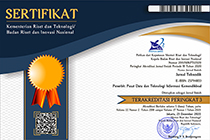PENGARUH PEMBELAJARAN BERBASIS PROYEK BERBANTUAN GOOGLE EARTH TERHADAP KETERAMPILAN BERPIKIR SPASIAL
DOI:
https://doi.org/10.32550/teknodik.v21i1.227Keywords:
Kata Kunci, Pembelajaran Berbasis Proyek, Google Earth, Berpikir Spasial Key Words, Project-Based Learning, Spatial ThinkingAbstract
Abstrak: Pembelajaran geografi berguna untuk membekali siswa keterampilan berpikir spasial. Pembelajaran geografi harus diarahkan menggunakan pendekatan saintifik. Pendekatan saintifik perlu memanfaatkan perkembangan teknologi terutama teknologi berbasis geospasial, salah satunya berupa Google earth. Penelitian ini bertujuan untuk mengetahuai pengaruh penggunaan pembelajaran berbasis proyek berbantuan Google earth terhadap keterampilan berpikir spasial. Metode yang digunakan dalam penelitian ini ialah dengan desain quasi experimental berupa pretest-posttest nonequivalent control group design. Penelitian dilakukan pada Kelas X IPS SMA Negeri 1 Cawas. Instrumen yang digunakan untuk mengukur keterampilan berpikir spasial adalah modifikasi dari Spatial Thinking Ability Test. Analisis data melalui t test dengan menggunakan SPSS 20.0 for windows. Hasil penelitian menunjukkan bahwa pembelajaran berbasis proyek berbantuan Google earth berpengaruh signifikan terhadap keterampilan berpikir spasial siswa. Di samping itu, juga ditemukan beberapa kelebihan dari pembelajaran berbasis proyek berbantu Google earth, antara lain: (1) mendorong siswa menjadi tertantang untuk menyelesaikan permasalahan nyata melalui kegiatan proyek, (2) siswa semakin aktif dalam pembelajaran, (3) kinerja siswa dalam menyelesaikan proyek lebih teratur, (4) siswa lebih memiliki keleluasaan untuk menyelesaikan proyek, (5) siswa termotivasi berkompetisi menghasilkan produk yang terbaik,dan (6) siswa mengalami peningkatan keterampilan berpikir spasial.
Kata Kunci: Pembelajaran Berbasis Proyek, Google Earth, Berpikir Spasial
Â
Abstract: Learning geography is useful to equip students spatial thinking skills. Learning geography should be directed to use a scientific approach. The scientific approach needs to harness technological developments mainly based geospatial technologies, one of them is Google earth. This study aims to determine the effect of the use of project-based learning assisted Google earth to spatial thinking skills. The method used in this research is to design the form of quasi-experimental pretest-posttest nonequivalent control group design. The study was conducted on Class X IPS SMA Negeri 1 Salam Babaris. The instrument used to measure the spatial thinking skills is a modification of the Spatial Thinking Ability Test. Analysis of the data by t test using SPSS 20.0 for windows. The results showed that the project-based learning Google earth aided significantly influence spatial thinking skills of students. In addition, also found some of the advantages of the project-based learning assisted Google earth, among others: (1) encourage students be challenged to solve real problems through project activities, (2) the students more active in learning, (3) the performance of students in complete the project more organized, (4) students have more flexibility to complete the project, (5) students are motivated to compete to produce the best product, and (6) students has increased spatial thinking skills.
References
Ardyodyantoro, Gatty. 2014. Pemanfaatan Google Earth Dalam Pembelajaran Geografi Untuk Meningkatkan Hasil Belajar Siswa Kelas X SMA Widya Kutoarjo. Yogyakarta: UNY. Skripsi tidak diterbitkan.
Bodzin, A., Anastasio, D., & Kulo, V. 2009. Designing Google Earth Activities for Learning Earth and Environmental Science. (in press). In MaKinster, Trautmann, & Barnett (Eds.) Teaching Science and Investigating Environmental Issues with Geospatial Technology: Designing Effective Professional Development for Teachers. Dordrecht, Netherlands: Springer.
Committee on Support for Thinking Spatially. 2006. Learning To Think Spatially. Washington, USA: National Academies Press.
Deutscher, Rebecca. 2011. Google Earth: How Are Teachers Using This Virtual Globe and How Can They Be Further Supported?. Orlando, USA: NARST.
Dewey, J. 1997. Experience and Education by John Dewey (1st Touchstone Edition). New York: Simon & Schuster Inc.
Direktorat Pembina SMA. 2014. Pembelajaran Geografi Melalui Pendekatan Saintifik. Jakarta: Direktorat Pendidikan Menengah Kementerian Pendidikan dan Kebudayaan.
Gersmehl, Philip J. and Gersmehl, Carol A. 2007. Spatial Thinking by Young Children: Neurologic Evidence for Early Development and “Educabilityâ€. Journal of Geography. Vol. 106, No. 5, pp 181-191.
Hadi, Bambang Saeful. 2012. Remote Sensing Implementation In Learning To Develop Students Spatial Thinking Skills. Disampaiakan pada Seminar Internasiaonal IGI ke-15 pada tanggal 3-4 November 2012 di Surakarta.
Ishikawa,T. & Kastens K.A. 2005. Why students have trouble with maps and other spatial representations. Journal of Geoscience Education Vol. 53, No. 2, pp 184-187.
Krajcik, J.S., & Shin, N. 2014. Project-Based Learning. Dalam S. Keith (Ed). The Cambridge Handbook of The Learning Science (hlm.275-297). New York: Cambridge University Press.
National Council for Geography. 2012. Geography for Life, 2nd Edition. Washington: NCG.
Riyadi, Slamet. 2011. Studi Eksperimen Penggunaan Google Earth sebagai Media Pembelajaran Sejarah Berbasis E-Learning Kelas XI IPS di SMA Negeri 1 Purwodadi Tahun Ajaran 2011/2012. Semarang: Unnes. Skripsi tidak diterbitkan.
Thankachan, Briju dan Franklin, Theresa. 2013. Impact of Google Earth on Student Learning. International Journal of Humanities and Social Science, Vol. 21, No. 3, pp 11-16.
Webster, M.L. 2015. GIS In AP Human Geography: A Means Of Developing Students’ Spatial Thinking? Disertasi tidak diterbitkan. Texas: University of North Texas.
Downloads
Published
How to Cite
Issue
Section
Citation Check
License
Please download and complete the Form, Copyright Transfer, and Ethics Statement Form. The following is provided at the time of submitting the text (Upload Additional Files):









